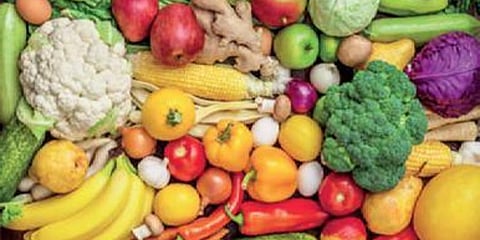Food Protection for Children
In this day and age, being a parent is not easy. With Coronavirus infections looming large over parents today, they are far more conscious of the food choices that they make for their children. Here are some guidelines that ensure children eat healthily and prevent infectious episodes. Rainbow on the plate: Fruits and vegetables besides providing vitamins and minerals are a rich source of bioactive molecules that can prevent disease. Make sure that for every meal has a minimum of two colours.
There is so much variety in the plant kingdom which is why adding colour to the plate should not be a problem. The point to remember here is that overcooking destroys both the colours as well as the heat sensitive vitamins (vitamin C and folic acid). This is why make sure that a part of the child’s diet includes raw veggies and fruits. This will allow the preventive and protective action of vitamin C to take place.Maintaining food hygiene when consuming raw foods by adequate washingshould not be ignored. What to drink: In addition to what the children are eating, it is also necessary to pay attention to the beverages that they are consuming.
It is best for them to avoid large quantities of sugary drinks. Contrary to what one usually believes, most packed juices have very little nutritional worth. Many of the fruit drinks have no fruit in them, except for some miniscule amounts of fruit juice concentrate hence don’t rely on them for nutrients!Drinking enough water all through the day should be given due attention. Water as a drink can be made more interesting by adding slices of lemon/ keenooto the pitcher. Alternatively basil or mint leaves in the water jug also works well to add flavour.
Fresh and fermented foods: I have written extensively about the benefits of fermented foods and this is a good time to remind you that besides other benefits, they help to ramp up the immune system. Yogurt, buttermilk, lassi comprise of the most commonly consumed fermented food in our culture. A fermented food or beverage is made by the growth of microbes that change the nutrients as well as the taste and texture of the food.The other commonly consumed fermented foods in India are idlis,dosas, appams, dhokla. Kanji, the popular beverage in the northern part of India in the winter months is another example of a fermented beverage.
Load up on Zinc: It is important to have a daily supply of zinc to support immune function in our body. As zinc is not stored in the body there is need to have the food sources of zinc on an everyday basis. Besides the animal sources of this mineral, pulses (dals), peas, all nuts and seeds contribute to this nutrient.
Vitamin D: Besides sunlight exposure the sources of vitamin D are limited in the vegetarian world are limited to butter, cream, cheese and milk(with fat). Egg yolk and fatty fish such as katla/surmai/ salmon are good sources. Some foods like oils and milk are now being fortified with Vitamin D in our country.
Probiotics: Probiotic foods can be value additions in the diet in these circumstances. Choose a strain of probiotic with proven immune enhancing properties as different strains of probiotics perform different functions. There is a minimum number of viable organisms that should be available from probiotic foods.
Neelanjana Singh Nutrition Therapist & Wellness Consultant

